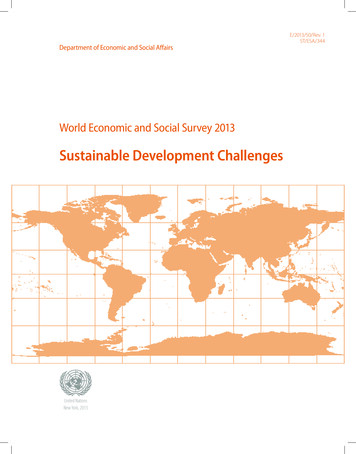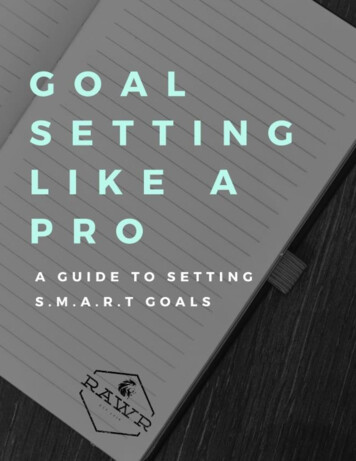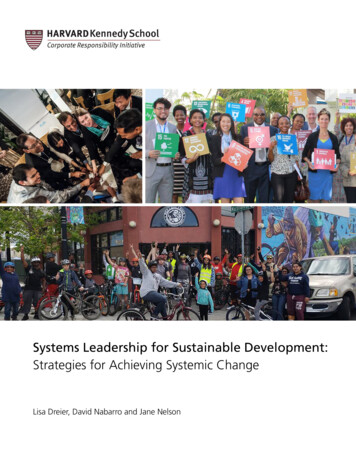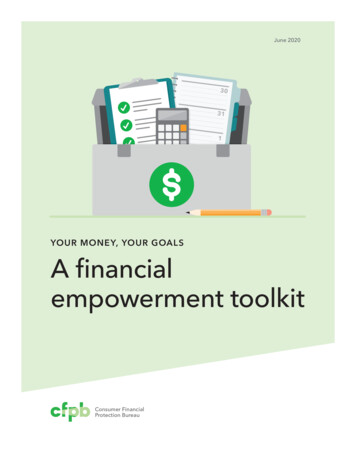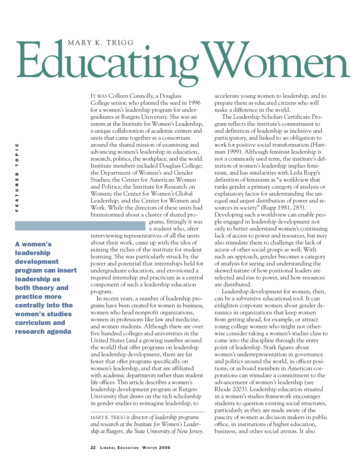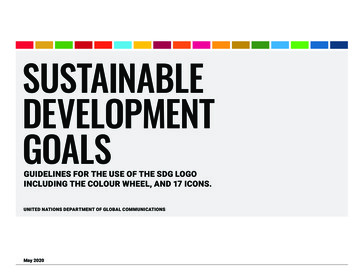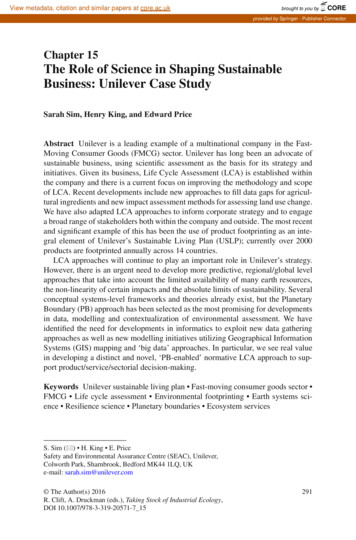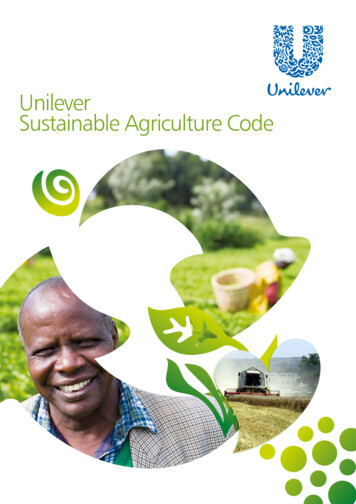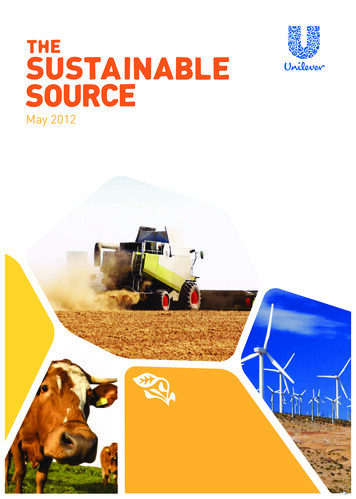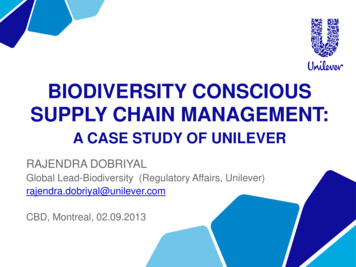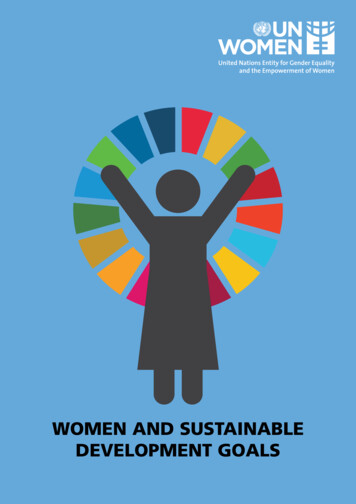
Transcription
WOMEN AND SUSTAINABLEDEVELOPMENT GOALSWOMEN AND SUSTAINABLEDEVELOPMENT GOALS1
With many thanks to the following for the analysis;UN Women HQ Communications and Advocacy SectionUN Women ESAR Multi/ Country OfficesSimone ellis Oluoch-Olunya-Deputy Regional Director, UN Women ESARFlorence Butegwa- Consultant on SDGs, UN Women ESARJack Abebe-Knowledge Management and Research Specialist, UN Women ESARMartha Wanjala-Communications Assistant, UN Women ESAR2WOMEN AND SUSTAINABLEDEVELOPMENT GOALS
EXECUTIVE SUMMARYOn 25 September on 25 September2015, the United Nations General Assembly adopted the 2030Agenda for Sustainable Development as the agreed framework for international development.It is the successor to the Millennium Development Goals (MDGs). However, unlike the MDGs,the 2030 Agenda presents a much wider scope by deliberately and more fully incorporatingeconomic and environmental sustainability, as well as the aspiration of many countries forpeaceful and inclusive societies. The agenda also applies to all countries rather than just thedeveloping countries. In this regard, the 2030 Agenda for Sustainable Development is moreambitious envisaging the eradication of poverty, the systematic tack-ling of climate change andbuilding peaceful, resilient, equitable and inclusive societies. The Agenda, unlike the MDGs, hasa stand-alone Goal on gender equality and the empowerment of women and girls. In addition,there are gender equality targets in other Goals, and a more consistent call for sex disaggregationof data across many indicators.UN Women Communications and Advocacy Section in New York conducted an analysis of whatthe 17 SDGs adopted mean to women in order to inform strategic interventions building onthe e orts of localization at country and regional levels. This analysis has been collated in thispublication and linked to UN Women Eastern and Southern Africa Regional and Country Officepriorities. Concrete examples programming interventions by UN Women country offices in theregion are pro led in relation to specific SDGs and how those streams of interventions could leadto localization e orts. This has been done through an analysis of all annual reports submittedby regional/ multi/country offices to identify work streams feeding into the localization ofsustainable development goals. The team comprising UN Women’s consultant on SDGs,Knowledge Management and Research Specialist and UN Women’s Regional CommunicationsAssistant, under the leadership of the Deputy Regional Director, linked to existing analysisprovided by UN Women on Women and Sustainable Development Goals (SDGs).The publication showcases how women are affected by each of the 17 proposed SDGs, as well ashow women and girls can — and will — be key to achieving each of these goals. Data and storiesof the impact of each SDG on women and girls is illustrated. UN Women Eastern and SouthernAfrica region’s efforts and interventions as they relate to SDGs are also discussed under eachSDG, including our programmes, intergovernmental work and advocacy for policy change.This publication is intended to help countries in Eastern and Southern Africa understand andappreciate the linkages between SDGs and women and girls in their localization e orts and inestablishing various partnerships and networks that feed into the vision of localizing SDGs atthe country and regional levels.WOMEN AND SUSTAINABLEDEVELOPMENT GOALS3
17 GOALS TO TRANSFORM OUR WORLD4WOMEN AND SUSTAINABLEDEVELOPMENT GOALS
SDG 1: End poverty in all its forms everywherePhoto: World Bank/Shehzad NooraniThe end of poverty can only be achieved withthe end of gender-based discrimination. All overthe world, gender inequality makes and keepswomen poor, depriving them of basic rights andopportunities for well-being.Women make significant contributions everyday from bringing an income to her householdas an employed wage earner, to creating jobs asan entrepreneur, to taking care of her family andelders. However, a woman farmer, for instance, maynot be able to make her crops thrive like a man canbecause she doesn’t have the same access to seeds,credit, technology and extension services. She isvery unlikely to own her land—only 20 per centof landowners globally are women. If she hopesto someday inherit family property, the law maydeprive her of an equal share, or social conventionmay simply favor her male relatives.Poverty comes with many risks; discriminationleaves women less resilient to these. In an economicdownturn, poor women are less likely to havesavings and abilities to make up for lost income.Poor girls are more than twice as likely to marry inchildhood asthosewhoarewealthy.They then facepotentially lifethreateningrisks from earlyp r e g n a n c y,and often lost hopes for an education and a betterincome.Women have a right to equal access to all avenuesto end poverty, from social protection safety netsto use of the latest technology. Fully realizing thatright will be key to achieving the first SDG.UN Women acts to end poverty through programmesto provide training, loans and practical skills toempower poor women economically, give thema voice, strengthen social services and increaseawareness of women’s rights. We also work toensure women’s access to basic services, controlover land and other forms of property, inheritance,natural resources, appropriate new technology andfinancial services.UN Women Country Initiatives on SDG 1 on Ending Poverty in All its FormsUN Women Ethiopia is supporting the Government of Ethiopia to accelerate rural women’s economicempowerment. The Rural Women Economic Empowerment program which was launched in 2012 atglobal level and 2014 in Ethiopia, aims to secure rural women’s livelihoods and rights in the contextof sustainable development and the post MDGs. The programme is being implemented in Guatemala,Kyrgyzstan, Liberia, Nepal, Niger, Rwanda and now in Ethiopia. Each country has defined its specificdetail programe implementation plan based on the local context, in partnership with governmentand other national stakeholders in line with government priorities. The Joint Programme on RuralWomen’s Economic Empowerment aims at accelerating rural women economic empowerment in thecontext of the country national policy priorities, as defined by Ethiopia’s Growth and TransformationPlan 2011-2015, and in contributing to the Millennium Development Goals (MDGs), as well as, to theemerging Sustainable Development Goals (SDGs).WOMEN AND SUSTAINABLEDEVELOPMENT GOALS5
SDG 2: End hunger, achieve food security and improved nutritionand promote sustainable agriculturePhoto: UN Women/Janarbek AmankulovWomen prepare up to 90 per cent of meals inhouseholds around the world, yet when times aretough, women and girls may be the first to eat less.Households headed by women may not eat enoughsimply because women earn at lower levels, and areless prepared to cope with sudden crisis.Nourishment is not just about the quantity of food,but its quality. In poor households, women can beless likely to get the nutrients they need, includingto manage the physical demands of pregnancyand breastfeeding. Gender inequality intersectswith inadequate health care, insufficient educationand limited income to drive these deprivations.Inequities in food consumption stand in contrast towomen’s significant role in agricultural production.They comprise on average 43 per cent of theagricultural labour force in developing countries,and over 50 per cent in parts of Asia and Africa.Yet their potential contribution to food securityremains constrained by unequal access to land andother productive assets.Ending hunger means that all women canconsume enough food with adequate nutrients. Allwomen working in agriculture, if unshackled from6WOMEN AND SUSTAINABLEDEVELOPMENT GOALSdiscrimination,cancontributeto greater globalfood security.UN Women actsto stop hungerbysupportingwomen’s role infood security, asthe cornerstonesof food productionand utilization. We Credit: Farming First and FAO.providetrainingfor women farmers and access to information andtechnology, to help women can achieve significantlyhigher agricultural productivity. UN Women alsoraises awareness among rural women and decisionmakers alike, on the need for legal changes to allowmore equitable distribution of assets, such as landand credit. The entity also steers the online globalknowledge hub Empower.org, where women canshare practical knowledge around food productionand technology.
UN Women Eastern and Southern Africa Country Initiatives on SDG 2 on EndingHunger, Achieving Food Security and Improved Nutrition and Promoting SustainableAgricultureTo accelerate rural women’s access to agricultural technologies, UN Women, in partnership withthe African Union (AU), the Food and Agriculture Organization (FAO), the International Fund forAgricultural Development (IFAD), and the World Food Programme (WFP) hosted a regional Sharefairfor Rural Women’s Technologies in ESA coinciding with the International Day of Rural Women andWorld Food Day 2014.The Sharefair gathered more than 100 innovators from 14 countries showcasing their technologiesdisplaying affordable ways to accelerate productivity, enhance value addition and income, improvenutrition, save women’s time, and reduce postharvest losses. In addition, more than 300 registeredparticipants attended the event. The Sharefair promoted technologies and innovations that supportrural female smallholder farmers in the ESA region and brought together rural women farmers/innovators, policymakers, academics, food producers, investors, financial service providers, and othertechnology innovators.Specific results included creation of a permanent technology repository comprising a menu oftechnology options that meet the needs of female farmers that is being finalized; establishment of aTechnologies Promotion Group to devise a strategy for upscaling the technologies demonstrated atthe Sharefair, with expected reach up to 2 million beneficiaries; through four high-level policy dialoguesenabling farming women and innovators to convey their voice and concerns to influence high-levelpolicy-makers; and youth innovators were awarded for innovations in agricultural technologies, hencemobilizing young men and women for profitable engagement in agriculture. In 2015, ESARO scaledits efforts from the results of the Sharefair in 2014 and focused on upscaling innovative technologiesfor rural women through the establishment of African Women in Technology (AWIT) initiative, andan Edutainment initiative with several partners (Kenya CO, FAO and IFAD) targeting about 6 millionviewers primarily in Kenya, but also in Uganda and Tanzania on issues such as post-harvest losses,women’s land rights, women’s economic empowerment.The African/Alliance Women in Technology (AWIT) initiative was launched at the World EconomicForum in Cape Town in June 2015. Initially a website has been developed and hosted by UN Women andit gathers all the information associated with and emerging from this initiative www.empowerwomen.org/cop/awit.Through this initiative, UN Women is establishing a global alliance to promote upscaling of ruraltechnologies for women. The initiative expands on the Sharefair on Rural Women’s Technologies heldin October 2014 in Nairobi and builds on the shared intent to upscale some of the great innovations tomeet robustly identified critical needs of rural women in line with the sustainable development goals.WOMEN AND SUSTAINABLEDEVELOPMENT GOALS7
SDG 3: Ensure healthy lives and promote well-being for allat all agesPhoto: UNICEF/SokolThe highest attainable standard of health is afundamental right of every person. Gender-baseddiscrimination, however, undercuts this right. It canrender women more susceptible to sickness andless likely to obtain care, for reasons ranging fromaffordability to social conventions keeping them athome.Among women of reproductive age worldwide,AIDS is now the leading cause of death. Not onlyare women biologically more susceptible to HIVtransmission, but their unequal social and economicstatus undercuts abilities to protect themselves andmake empowered choices.Countries have committed to universal access tosexual and reproductive health care services, butmany gaps have slowed progress so far. Morethan 225 million women have an unmet need forcontraceptive methods. In developing regions,where maternal mortality rates are 14 times higherthan in developed ones, only half of pregnantwomen receive the minimum standard for antenatalcare.Fulfilling the right to health requires health systemsto become fully responsive to women and girls,offering higher quality, more comprehensive andreadily accessible services. Societies at large mustend practices that critically endanger women’s8WOMEN AND SUSTAINABLEDEVELOPMENT GOALShealth and well-being—among them, all forms ofgender-based violence.UN Women advances women’s well-being andhealth by working with governments to improve theprovision of health services for women and girls,including survivors of violence, and backing nongovernmental partners in filling gaps. The entitystrives to end practices that endanger women andgirls, such as child marriage, female genital cutting,dietary restrictions and others. The programmeshelp meet women’s health needs during medicalhumanitarian crises, restoring confidence inmaternal and child health services in the wake ofEbola virus disease in West Africa. We also supportand empower women living with HIV and AIDS.
UN Women Country initiatives to ensure healthy lives and promote well-being forall at all agesIn August 2014, UN Women ESARO in partnership with its regional partner “LVCT Health” and othercapacity building institutions working in the health sector, collaborated in the development of trainingmaterials and in the facilitation of a training programme which utilized capacity-building, peer-topeer and mentorship models and tools, towards strengthening the leadership, management andadvocacy skills of networks and associations of WLHIV and HIV/AIDS Caregivers. The training materialsborrowed from existing training models and tools, and the in-puts of experts within the region. Thetraining also borrowed from the lessons the successes of the global HIV and AIDS movement whichsuccessfully advocated for the development of national HIV/AIDS policies and strategies, and HIVresponsive business practices. The overarching aim was to build the capacities of women leaderswithin these networks and associations to influence national and regional frameworks and policies torespond to gender issues within the context of efforts to control and manage HIV and AIDS. Currently,the module is undergoing review and revision to align it with the SDG 3 on ensuring healthy lives andpromotion of wellbeing for all at all ages.WOMEN AND SUSTAINABLEDEVELOPMENT GOALS9
SDG 4: Ensure inclusive and equitable quality educationand promote lifelong learning opportunities for allPhoto: UNICEF/LeMoyneAll developing regions of the world have achieved— or almost achieved — equal enrolment of boysand girls in primary school. This is an historicaccomplishment, but far from complete. In subSaharan Africa, only 23 per cent of poor ruralgirls finish primary school. Gender gaps widensignificantly in many countries in secondary andtertiary schools.Education is a right. It empowers individuals toincrease their well-being and contributes to broadersocial and economic gains. Improved educationaccounts for about 50 per cent of economic growthin Organization of Economic Co-operation andDevelopment countries over the past five decades.About half is due to more women entering higherlevels of education, and greater equality as to theyears men and women spend in school.For education to deliver, it must be inclusiveand high-quality. Active efforts to end genderstereotypes must tackle those that limit schoolingor channel women and girls into ‘acceptable’ areasof study or work.For all girls and boys, men and women, educationmust be available across their lifetimes. Pre-primaryeducation establishes a foundation on which all later10WOMEN AND SUSTAINABLEDEVELOPMENT GOALSschooling can build. Ongoing learning for adultsbroadens choices for productive and fulfilling lives.UN Women acts to promote education — a corepre-requisite for gender equality and women’srights – through the revision of school curriculaand policies to counteract gender discrimination,improving access to information technologies, andtraining for teachers, students and parents. Alongwith the World Association of Girl Guides and GirlScouts, UN Women has developed a non-formaleducational curriculum to prevent violence againstwomen and girls, which educators and youthleaders are being trained to deliver in more than adozen countries.
UN Women Eastern and Southern Africa Country Office Selected Initiatives on ensuringinclusive and equitable quality education and promoting lifelong learning opportunitiesfor allMalawi Country Office is working with the Ministry of Education in Malawi and Girls and not Brides toinfluence the implementation of the girls’ education strategy in Malawi. UN Women also supported theNational Girls Education Network in implementing the National Girls Education Strategy in the country.UN Women helped develop an advocacy plan focusing on ending child marriage and early pregnanciesin Malawi which will then contribute to access, retention and completion of schooling by girls in Malawi.Traditional and religious leaders have been consulted, trained and lobbied to implement and monitoraction plans to engage traditional leaders in support of girls’ education as well. Best practices in thesupport of the development and implementation of bylaws promoting girls’ education have beendocumented, shared and disseminated with communities for future replication. A National Girls’Education Conference was also held in 2015. Advocacy activities included the organization of a filmpremier, Mercy’s Blessing, and that touched issues of inequality between girls and boys, especially ineducation. Overall, the advocacy activities focused on empowering children and youth to enable theirvoices to be heard and to promote a more participatory approach to find solutions and address theroot causes of violence while addressing inequalities evident in the education system in Malawi andcontributing to the implementation of sustainable development goal 4 on Education.WOMEN AND SUSTAINABLEDEVELOPMENT GOALS11
SDG 5: Achieve gender equality and empower all women andgirlsPhoto: UNPhoto/Sylvain LietchtiThe sustainable development goals seek to changethe course of the 21st century, addressing keychallenges such as poverty, inequality, and violenceagainst women.Women’s empowerment is a pre-condition for thisWomen have a critical role to play in all of the SDGs,with many targets specifically recognizing women’sequality and empowerment as both the objective,and as part of the solution. Goal 5 is known as thestand-alone gender goal because it is dedicated toachieving these ends.Deep legal and legislative changes are needed toensure women’s rights around the world. While arecord 143 countries guaranteed equality betweenmen and women in their Constitutions by 2014,another 52 had not taken this step. In many nations,gender discrimination is still woven through legaland social norms.Stark gender disparities remain in economicand political realms. While there has been someprogress over the decades, on average women inthe labour market still earn 24 per cent less thanmen globally. As of August 2015, only 22 per centof all national parliamentarians were female, a slowrise from 11.3 per cent in 1995.Meanwhile, violence against women is a pandemicaffecting all countries, even those that have madelaudable progress in other areas. Worldwide, 3512WOMEN AND SUSTAINABLEDEVELOPMENT GOALSper cent ofwomenhaveexperiencedeither physicaland/or sexuali n t i m a t ep a r t n e rviolenceornon-partnersexual violence.UNWomenjoined the voices of many global actors in pointingout that violence was absent from the MillenniumDevelopment Goals.Women have a right to equality in all areas. It mustbe embedded across legal systems, upheld inboth laws and legal practices, including proactivemeasures such as quotas. Since all areas of liferelate to gender equality, efforts must be made to
cut the roots of gender discrimination whereverthey appear.UN Women works to empower women and girlsin all of its programmes. Advancing women’spolitical participation and leadership and economicempowerment are two of the entity’s centralgoals. UN Women supports more women to geton ballots, attain political office and go to pollsto vote. We assist women to secure decent jobs,accumulate assets, and influence institutionsand public policies, while underlining the need torecognize, reduce and redistribute the burden onwomen for unpaid care. We promote women’s roleand leadership in humanitarian action, including inconflict-prevention and efforts to ensure peace andsecurity. We advocate for ending violence, raiseawareness of its causes and consequences andboost efforts to prevent and respond, includingensuring the rights of women living with HIV. Wealso work to ensure that governments reflect theneeds of women and girls in their planning andbudgeting, and engage men and boys, urging themto become champions of gender equality, includingthrough our HeForShe initiative.UN Women Eastern and Southern Africa Country Office Selected Initiatives onGender Equality and Women’s EmpowermentThis directly falls within our ambit. UN Women is grounded in the vision of equality enshrined in theCharter of the United Nations, works for the elimination of discrimination against women and girls;the empowerment of women and girls; and the achievement of equality between women and men aspartners and beneficiaries of development, human rights, humanitarian action and peace and security.UN Women’s Regional focus varies in different countries depending on country specific needs but arenot limited to (i) expanding women’s leadership and participation; (ii) enhancing women’s economicempowerment; and (iii) ending violence against women. In addition, UN Women in Eastern andSouthern Africa also actively participates and contributes to various UN inter-agency processes andcollaborates with UN organizations around specific programme areas and governments within theUNCT frameworks to support and build development interventions feeding into the localization ofSDGs at country and regional levels. In 2015, for example, UN Women in Kenya supported the NationalGender and Equality Commission (NGEC) in improving the ability of the Commission to carry outits mandated role to allow a transformative gender equality in Kenya to take place, UN Women andNGEC entered into a partnership to work together on a programme for public and private sector.The cooperation yielded many diverse and complimentary results. For example, a tool to measureinclusivity at the county level and capacity development on gender responsive budgeting (GRB)at the counties in Kenya was developed. The capacity of NGEC was also strengthened to lead themonitoring of compliance on planned inclusivity in the final national budget in Kenya. UN Women’sanalysis showed that the financial year 2015/16 budget was prepared with a focus on pro-poor growthand sustainable development and the emphasis was on strategic intervention areas.WOMEN AND SUSTAINABLEDEVELOPMENT GOALS13
SDG 6: Ensure availability and sustainable managementof water and sanitation for allPhoto: UN Photo/Martine PerretA drink of water sustains human life, but only if it issafe and affordable. From 1990 to 2015, 2.6 billionpeople gained access to improved drinking water,but 663 million still rely on unimproved sourceslike unprotected wells and springs. Water qualityhas deteriorated through pollution, and worseningscarcity pressures over 40 per cent of the globalpopulation.For women, inadequate water supplies poseadditional burdens. In a single day in 25 subSaharan African countries, women spend 16 millionhours collecting water, often to the detriment ofschooling or paid work, and with potential healthrisks from repeatedly carrying heavy burdens overlong distances.Poor quality sanitation—including open defecation—can pollute water and spread disease. Sanitationhas improved for 2.1 billion people between 1990and 2015, and open defecation has fallen by nearlyhalf, yet 2.4 billion people still rely on unimprovedsanitation facilities. In schools, a lack of separatefacilities for girls can be a major reason for parentskeeping them at home.14WOMEN AND SUSTAINABLEDEVELOPMENT GOALSEnsuring water and sanitation for all is the goal;achieving it must take all dimensions specificto women and girls on board, and involve themdirectly in the process.UN Women acts to provide water and sanitationto all by helping governments craft policies andprogrammes that respond to women’s needs andunderpin sustainable services. Gender-responsivebudgeting, for instance, can channel funds towardsmeasures to improve easy access to safe drinkingwater so that women have more time to earn anincome, girls are more likely to attend school, andfamily health and hygiene improve.
SDG 7: Ensure access to affordable, reliable, sustainableand modern energy for allWORLD ENERGY COUNCIL SECRETARIESPhoto: UN Women/Gaganjit SinghSustainable modern energy fuels development, from thelight that allows a child to do her homework to streetlampsallowing women to travel safely home at night. Universalaccess requires energy to be affordable and reliable.Generating it must not irreversibly harm the environment.In households, women are often the primary energymanagers. When modern sources are not available, theyspend hours each day collecting fuel to cook and heattheir homes. Many suffer poor health through indoor airpollution generated, for example, by a rudimentary stovethat smokes heavily as it burns wood or animal dung.Some indications suggest that women are more likely thanmen to conserve energy—using up to 22 per cent less,including through a greater willingness to alter everydaybehaviours. However, women are largely absent in theindustries that produce modern sources of renewableenergy, comprising only 20 per cent of the workforce.As primary energy managers in households, women couldplay powerful roles in extending sustainable modern energy.All elements of energy planning and policy-making need tofactor in gender dimensions and actively advance women’sleadership. Within the energy industry itself, barriers towomen executives, entrepreneurs and employees must fall.Women18%Men82%WORLD ENERGY COUNCIL CHAIRSWomen4%Men96%(24 men to 1 woman)WOMEN AND SUSTAINABLEDEVELOPMENT GOALS15
And their representation on national and globalenergy council must grow.UN Women’s efforts extend energy access andenable women to electrify their communities.Through the Barefoot College in India, the entityhas helped train illiterate older women from ruralcommunities in various geographic regions assolar engineers. UN Women is also part of theGlobal Alliance for Clean Cook Stoves, whichadvocates for a global market for clean andefficient household cooking devices. In Ghana, UNWomen’s Fund for Gender Equality has introducedgreen cook stoves. And since 2011, UN Women hassponsored the Gender Equality Award grantedby the SEED Initiative, a global partnership foraction on sustainable development and the greeneconomy, which has prized many clean energyinitiatives involving women. And new green energyprogrammes are in the pipeline.UN Women Eastern and Southern Africa country office selected initiatives onensuring access to affordable, reliable, sustainable and modern energy for allIn partnership with the UN Foundation, WHO, UNICEF and UNFPA, UN Women Uganda countryoffice systematically engaged the media in raising awareness of policy makers on women’s healthand energy service provision in health institutions. The project was aimed at bringing to light thechallenges that women face in accessing health services, especially maternal and child health servicesin light of inadequate power and energy supply to health centres in Uganda. The media with supportfrom UN Women visited health centres in selected districts and produced many moving challengesexperienced by women especially during pregnancy.The documented challenges have continued running in different media, with the result that Governmenthas adopted several resolutions to improve energy services in health centres for the benefit of womenand children. A multi-stakeholder consultation workshop was also held which helped in formingthematic networks for collaboration, partnerships and advocacy for action. UN Women organizedconsultations were meant to mobilize and advocate to gender, health and energy stakeholders in thepublic and private sectors, CSOs, the UN system, and other partners to ensure electricity provision tohealth facilities through sustainable energy improves health outcomes for women and girls, and alsofor men and boys.It was also used to identify and share best practices on health facility electrification, including throughrenewable and efficient energy options, and ones that specifically address women’s and children’shealth by emphasizing gender concerns and involving gender stakeholders. It explored the extentto which the policy environment is gender-responsive and supportive to providing energy accessacross the health system and ways to induce progress and discussed means for inclusion of healthfacility electrification in national energy and health planning and programming, especially low-carbon,climate-resilient options. UN Women also used the consultations to identify funding opportunities –in national budgets, via regional cooperation mechanisms, private financing or donor funding – thatcould support expanded and reliable sustaina
women’s land rights, women’s economic empowerment. The African/Alliance Women in Technology (AWIT) initiative was launched at the World Economic Forum in Cape Town in June 2015. Initially a website has been developed and hosted by UN Women and it gathers all the information associated
